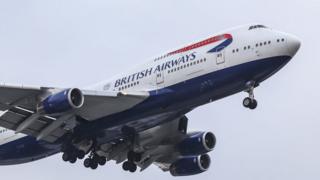British Airways retires entire 747 fleet after travel downturn
 .
.
.
British Airways has said it will retire all of its Boeing 747s as it suffers from the sharp travel downturn.
The UK airline is the world’s largest operator of the jumbo jets, with 31 in the fleet.
“It is with great sadness that we can confirm we are proposing to retire our entire 747 fleet with immediate effect,” a BA spokesman told the BBC.
Airlines across the world have been hit hard by coronavirus-related travel restrictions.
“It is unlikely our magnificent ‘queen of the skies’ will ever operate commercial services for British Airways again due to the downturn in travel caused by the Covid-19 global pandemic,” the spokesman added.
BA, which is owned by International Airlines Group (IAG), said the planes will all be retired with immediate effect. The 747s represent about 10% of BA’s total fleet.
- The first Boeing 747 flight took place in February 1969
- It was the first aeroplane dubbed a “jumbo jet”
- BOAC, British Airways’ predecessor, operated its first 747 flight, flying from London to New York, in 1971
- Fastest operating commercial plane, with a top speed of just over 650mph
- 3.5 billion passengers transported in 50 years
- First plane to fly London to Sydney non-stop in 1989
It had planned on retiring the planes in 2024 but has brought forward the date due to the downturn.
According to travel data firm Cirium there are about 500 747s still in service, of which 30 are actively flying passengers. More than 300 fly cargo and the remainder are in storage.
A luxury BA could no longer afford
The Boeing 747 is beautiful, distinctive and has half a century of proud service behind it. But – as a passenger plane at least – it is also quite simply outdated.
A four-engine aircraft, it is far less efficient than modern twin-engine models, such as the Airbus A350, the 787 Dreamliner, or even the older Boeing 777 – all of which are cheaper to run.
Before the Covid-19 crisis, the writing was on the wall. Airlines such as Air France, Delta and United had already retired their fleets.
BA had planned to use them for another few years. But the crisis in the industry means a future in which there will be fewer passengers, fewer planes – and keeping costs down will be crucial.
So now the airline has decided the queen of the skies is a luxury it can no longer afford.
British Airways’ predecessor BOAC first started flying 747s in the early 1970s. BA is currently flying the 747-400 version of the long-range aircraft.
It is currently the world’s biggest operator of 747-400s and first took delivery of them in July 1989. Originally, the upper deck contained a lounge which was known as the “club in the sky”.
The British carrier added it would operate more flights on modern, more fuel-efficient planes such as its new Airbus A350s and Boeing 787 Dreamliners.
It expects them to help it achieve net-zero carbon emissions by 2050.
.
.
The first Boeing 747 to be operated by BOAC arrives at London’s Heathrow Airport in May 1970.
Boeing’s 747 helped democratise global air travel in the 1970s, and marked its 50-year flying anniversary in February 2019.
A wave of restructuring triggered by the virus outbreak is hitting airlines across the world, along with plane-makers and their suppliers. Thousands of job losses and furloughs have been announced in recent weeks.
Up to 12,000 BA staff, including pilots cabin crew, engineers and ground staff are facing redundancy as the airline slashes costs in the wake of the coronavirus pandemic.
.
.
Captain Douglas Redrup of BOAC stands with members of his flight crew before taking off on the first scheduled flight.
What happens to retired planes?
Specialist companies assess whether aircraft should be salvaged or scrapped. Often they are dismantled and their parts sold on for scrap or recycled. Most of the value is in the engines.
Many are also stripped out as they have valuable interiors. In some cases, private individuals and entrepreneurs buy old airliners to convert them into hotels, restaurants and tourist attractions.
Those that are scrapped can end up in giant aircraft graveyards in the desert where they are left to rust.




.jpeg?width=682&height=455&name=AdobeStock_295048993%20(1).jpeg)

